【冀教版】七年级英语下册听力训练(MP3+素材)Unit7-最新教学文档
冀教版七年级英语下册Unit 7 单元测试卷(含听力材料及答案)
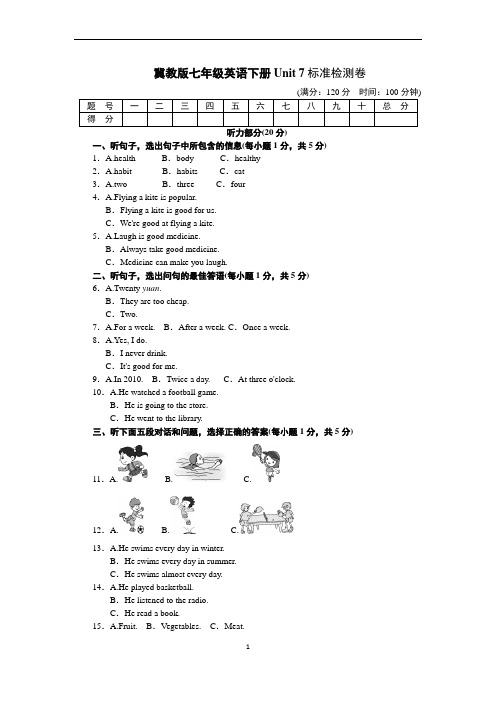
冀教版七年级英语下册Unit 7标准检测卷题号一二三四五六七八九十总分得分听力部分(20分)一、听句子,选出句子中所包含的信息(每小题1分,共5分)1.A.health B.body C.healthy2.A.habit B.habits C.cat3.A.two B.three C.four4.A.Flying a kite is popular.B.Flying a kite is good for us.C.We're good at flying a kite.5.ugh is good medicine.B.Always take good medicine.C.Medicine can make you laugh.二、听句子,选出问句的最佳答语(每小题1分,共5分)6.A.Twenty yuan.B.They are too cheap.C.Two.7.A.For a week. B.After a week. C.Once a week.8.A.Yes, I do.B.I never drink.C.It's good for me.9.A.In 2010. B.Twice a day. C.At three o'clock.10.A.He watched a football game.B.He is going to the store.C.He went to the library.三、听下面五段对话和问题,选择正确的答案(每小题1分,共5分)11.A. B. C.12.A. B. C.13.A.He swims every day in winter.B.He swims every day in summer.C.He swims almost every day.14.A.He played basketball.B.He listened to the radio.C.He read a book.15.A.Fruit.B.Vegetables.C.Meat.四、听短文填空(每小题1分,共5分)16.The boy has bread and ________ for breakfast.17.The boy likes eating ________ and beef for his lunch.18.Supper is the ________ meal for the boy.19.There are many kinds of ________ which can be made into delicious food. 20.The boy has to eat some ________ and fruit instead of meat from now on.笔试部分(100分)五、单项选择(每小题1分,共15分)21.Please move a little. You've got in________way.A. aB. anC. theD. /22.We can get more ________ about the international affairs on the Internet than before.A.information B.messageC.notice D.advertisement23.My mother says eating a lot of vegetables________my health.A.is good to B.is good inC.is good for D.is good at24.—I have great________in finishing the work by myself.I'm so proud!—Congratulations!A.fun B.success C.advice D.difficulty25.My father tries________vegetables eleven to twelve times a week.A.eat B.to eat C.ate D.to eating26.Most students spend too much time ________computer games.A.playing B. play C. plays D. played27.He didn't like the computer games________.A.no more B.no longerC.any more D.many more28.Dick decided________his eating habits.A.change B.to changeC.changing D.to changing29.________,Bill! It's time to go to school.A.Wake up B.Look upC.Make up D.Take up30.Don't watch________TV or play________computer games.A.too many;too many B.too much;too muchC.too many;too much D.too much;too many31.Maria________watch TV, but now she________listening to music.A.used to; is used to B.is used to; used toC.used to; used to D.is used to; is used to32.Police: What's in your wallet?Owner: There________some money and two tickets for today's e-sports competition.A.is B.was C.are D.were33.He does little exercise.He is________weight.A.putting up B.putting downC.putting on D.losing34.Remember________the book to the library when you finish________it.A.to return;to read B.returning;readingC.to return;reading D.returning;to read35.—Mom, I won first place in the sports events.—________. Congratulations!A.It doesn't matter B. There's nothingC.Good luck D. Good work六、完形填空(每小题1分,共10分)(词数:约150;建议用时:7分钟)Nick is a 14-year-old schoolboy.His life is full of exams and studies on weekdays.He has ________(36) free time.He thinks playing computer games ________(37) the best way to make him relaxed.When he has free time,he sits in front of the computer.Just ________(38) that way,he doesn't eat or drink for several hours.Last weekend,he played games on the computer again.He was too ________(39)and didn't want to move.He didn't have ________(40)for six hours.When he had to go to the bathroom,he found he could not move.His mother ________(41)him to the hospital.The doctor told him he should have a good rest and ________(42) more exercise.After coming back from the hospital,Nick follows the doctor's ________(43).He often plays soccer with his friends.________(44)sometimes he still plays computer games on weekends,he ________(45) does it for long.Now he lives a happy and healthy life. 36.A.few B.a few C.much D.little37.A.is B.are C.be D.were38.A.on B.for C.like D.since39.A.excite B.excites C.exciting D.excited40.A.something B.anything C.nothing D.everything41.A.is taken B.was taken C.was taking D.took42.A.take B.paid attention toC.take care of D.take out43.A.dreams B.advices C.advice D.hobbies44.A.Unless B.And C.Because D.Although45.A.ever B.often C.never D.always七、阅读理解(每小题2分,共30分)A(词数:约130;建议用时:5分钟)As time goes by, sports have become more and more important in people's modern life.People take part in different kinds of sports, like football, basketball, table tennis, swimming and so on.Sports are popular all over the world.People also like watching sports matches.Sports stars are very popular with people, especially students.There are sports matches all over the world nearly every day, but the most important and famous are the Olympic Games (奥林匹克运动会).Every athlete (运动员) wants to win the games.At that time all sports fans sit in front of TV to watch games.Some even go to the stadium (体育馆) to watch the games.Why are sports so popular? Because sports can keep our body strong.Do you like playing sports? How often do you exercise?46.________have become an important part of people's life.A.TVs B.ComputersC.Sports D.Telephones47.People can ________.A.change sports rules B.take part in sportsC.watch sports matches D.Both B and C48.The Olympics Games are ________.A.Car races (比赛) B.sports matchesC.World Cups D.Asian Games49.In the Olympics, athletes try their best to ________.A.win the gamesB.show their strong bodyC.keep healthyD.make money50.Which of the following is NOT true according to the passage?A.Sports can keep our body strong.B.There aren't sports matches nearly every year.C.Sports are popular all over the world.D.Sports stars are very popular with students.B(词数:约180;建议用时:6分钟)From:anne1@ Sent:Wed.,Oct.19 To:tss liam@Subject:Hello!Hi, Liam!So you're my new pen friend. Let me tell you a bit about myself. I'm 14 years old and I live in Calgary, Canada. I have two older brothers, Brian and Sam. I'm the only girl.I love sports and I'm always looking for exciting new hobbies to try. I like playing baseball in winter.It's fun beating the boys! But summer is my favourite time of the year. I love skateboarding and rock climbing in summer.Skateboarding's great because it's so fun and easy to learn! I often skateboard after school. There are many places in the park where I can do stunts. I'm good at stunts like jumping and turning the skateboard!Rock climbing is also really fun. I usually climb with my dad on weekends. We can't do it on real mountains very often because we live in the city. We do indoor rock climbing instead but it's not as challenging.So that's me! How about you?Please write back soon!Bye for now!Anne51.Who wrote this email?A.Liam. B. Brian. C. Sam. D.Anne.52.What is the writer like?A.Active. B.Shy. C.Lazy. D.Kind.53.The writer sent this email in order to________.A.describe some exciting sportsB.look for a suitable pen friendC.make a self-introductionD.show others her hobbies54.When is the best time of the year for the writer?A.Spring. B.Summer. C.Autumn. D.Winter.55.Which of the following is NOT right according to this passage(文章)?A.The writer is from Canada.B.The writer loves sports.C.The writer is good at stunts when skate-boarding.D.The writer often climbs the real mountains on weekends.C(词数:约220;建议用时:8分钟)Sometimes it may seem difficult to improve our health.If so,the following health habits may help you.·Eat breakfast every morning.Research shows that if you eat a meal in the morning you may not become too fat or eat too much during lunch.Eating breakfast can help people feel better through the day.·Get enough sleep.Poor sleep can influence our memory and learning.It can also cause traffic accidents!Studies show that people who don't get enough sleep seem to get into more accidents.So stay safe and get enough sleep!·Take a walk every day.Walking is an easy way to exercise.You'd better meet friends for a walk,not for a meal.As you walk,you will see the beautiful world around you.Once you try,you will find that adding a walk into your daily life is very easy.·Join social groups.Social groups can provide support.They might include sports teams,art or music groups.People in the group can offer advice and can help each other in difficult times.Also,being in a group keeps your mind busy.An active mind is a healthy mind!·Have a hobby.A hobby could be running,reading or making something with your hands.Hobbies help people to relax and rest.Hobbies bring us joy as well.56.You may have a good memory and learn better if you ________.A.eat breakfast every morningB.have a good sleepC.take a walk every dayD.join a social group57.If you need help and want to help others,you'd better ________.A.invite your friend to a mealB.make something with your friendsC.become a member of a social groupD.have a hobby58.Which of the following is TRUE?A.If you have breakfast every morning,you'll be fat.B.All the traffic accidents are caused by poor sleep.C.To join a social group helps you have a healthy mind.D.Having a hobby is the best way to relax.59.The passage is mainly written for ________.A.students at schoolB.people who don't like runningC.students who never have breakfastD.people who want to improve health60.Which is the best title(标题)of the passage?A.Ways to Improve Your HealthB.Reasons for Keeping HealthyC.Good HabitsD.Breakfast and Exercise八、任务型阅读(每小题2分,共10分)(词数:约130;建议用时:4分钟)We ask three people how to be healthy.Let's look at what they say.Lu Han:I__think__exercise__is__good__for__us.Exercise makes us healthy.I usually do lots of exercise every day.I like to run,play football and dance.I think running and playing football are fun.And dancing is relaxing.Wang Yuan:I think lots of sleep is very important.I go to bed at 9:30 in the evening and I get up at 6:30 in the morning.Then I do some sports with my friends after school.Ouyang Nana:Eating healthy food is very important.I eat lots of fruit and vegetables every day.I don't eat hamburgers.I like taking a walk.I usually take a walk with my sister.It is really interesting.61题判断正误(“T”表示正确,“F”表示错误);62题完成句子;63—64题简略回答问题;65 题将文中画线句子译成汉语。
英语七下(冀教版)教学课件Unit7Lesson
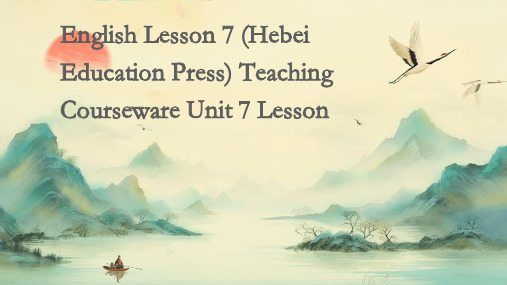
02
Teaching content
Text explanation
Text structure
Analyze the overall structure of the text to understand the organization and logic of the content.
Theme
Situational teaching
01
02
03
定义
情景教学法是一种基于真 实或模拟的情境进行语言 教学的方法。
应用
教师可以通过创造与课程 内容相关的真实或模拟情 境,帮助学生更好地理解 和应用英语。
优势
情景教学法能够激发学生 的学习兴趣,提高他们的 语言实际应用能力。
Task driven
Textual elaboration
Analyze the text structure
Analyze the structure of the text to help students understand the main idea and logical relationships between paragraphs.
Critical thinking
To encourage students to think critically about the topic and analyze different perspectives, opinions, and arguments.
Collaboration
To promote teamwork and cooperation among students by encouraging them to work together on group projects or activities.
冀教版英语七年级下册Unit7Lesson40《MoveYourBody》教学设计
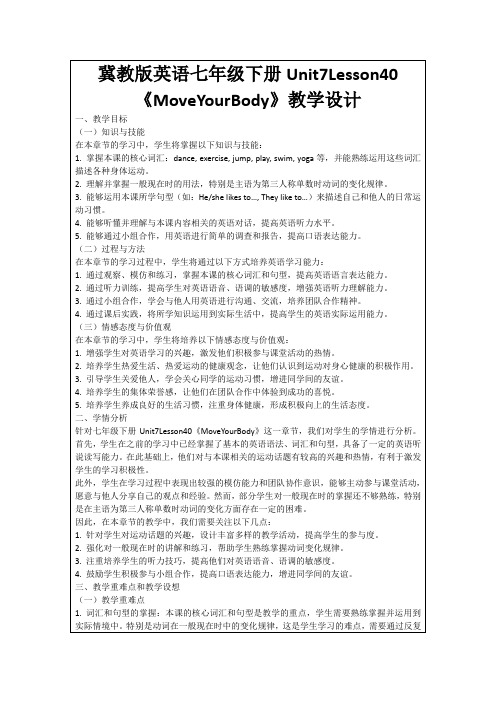
冀教版英语七年级下册Unit7Lesson40《MoveYourBody》教学设计
一、教学目标
(一)知识与技能
在本章节的学习中,学生将掌握以下知识与技能:
1.掌握本课的核心词汇:dance, exercise, jump, play, swim, yoga等,并能熟练运用这些词汇描述各种身第三人称单数时动词的变化规律。
在本章节的学习中,学生将培养以下情感态度与价值观:
1.增强学生对英语学习的兴趣,激发他们积极参与课堂活动的热情。
2.培养学生热爱生活、热爱运动的健康观念,让他们认识到运动对身心健康的积极作用。
3.引导学生关爱他人,学会关心同学的运动习惯,增进同学间的友谊。
4.培养学生的集体荣誉感,让他们在团队合作中体验到成功的喜悦。
3.能够运用本课所学句型(如:He/she likes to…, They like to…)来描述自己和他人的日常运动习惯。
4.能够听懂并理解与本课内容相关的英语对话,提高英语听力水平。
5.能够通过小组合作,用英语进行简单的调查和报告,提高口语表达能力。
(二)过程与方法
在本章节的学习过程中,学生将通过以下方式培养英语学习能力:
6.教学评价:采用形成性评价和终结性评价相结合的方式,关注学生的学习过程和结果,及时给予反馈和鼓励,提高学生的自信心。
四、教学内容与过程
(一)导入新课
1.教学活动:播放一段与本课主题相关的英文视频,如孩子们在操场上做各种运动的画面,让学生直观地感受到运动的乐趣。
2.教师提问:引导学生思考视频中出现了哪些运动项目,并让学生用英语尝试表达出来。
(四)课堂练习
1.教学内容:设计多种形式的练习题,如填空、选择、匹配等,让学生巩固所学知识。
【冀教版】七年级英语下册听力训练(MP3+素材)Unit8-学习文档

Unit8一、听句子,改正其中一个与录音原文不同的单词。句子读一遍。1.Some people like old music.2.Let’s go and enjoy the concert tonight.3.Is the Swedish rock band giving a concert in your city?4.They visited some parts of China and gave concerts there.5.Miss Jenkins thinks it important to learn a foreign language.二、听对话,选择正确答案。对话读两遍。6.M:When was your brother born,Jill?W:In June.7.W:Where are you going,Dick?M:To the concert of a rock band.8.M:How many singers are there in the band?W:Only three.9.W:Whose sister is good at languages?M:Susan’s sister is.10.M:Is your teacher married,Roy?W:Yes. She got married last September.三、听长对话,选择正确答案。对话读两遍。M:What are you going to do this summer?W:I’m going to stay in the city.M:What will you do all day?W:I’m going to work with my father at the store. In the evening, I’ll read books. On weekends, I’ll go to beach with my family.M:Have you ever worked?W:No,but I can learn. What are you going to do this summer?M:I’m going to camp. I’ve gone to camp for four summers.W:I’ve n ever done that. What do you do there?M:We do many things. In the morning,we go swimming. In the afternoon, we play basketball or tennis. We sit around a fire at night. We sing and tell stories.W:That sounds wonderful.M:It is wonderful. What’s John going to do this summer?W:I think he’s going to the mountains with his parents.M:Well,so long, Mary. Have fun.W:You too,Peter. I’ll see you in September.四、听短文,选择正确答案。短文读两遍。It was quite late at night. I was reading a newspaper alone in my room when I heard someone knocking at the door. I opened it and saw a young man with glasses standing there. He said that he was a friend of my brother’s and wanted to have a talk with him. I didn’t know if my brother had such a friend, but I had to let him in.As we talked,I found that he knew nothing about my brother. Then I came to know that his words were not true. Suddenly my brother rushed in and the young man was so surprised that he didn’t know what to do for a moment. We caught the man and called the police at the same time.第 1 页。
【教育资料】【冀教版】七年级英语下册听力训练(MP3+素材)Unit7学习专用
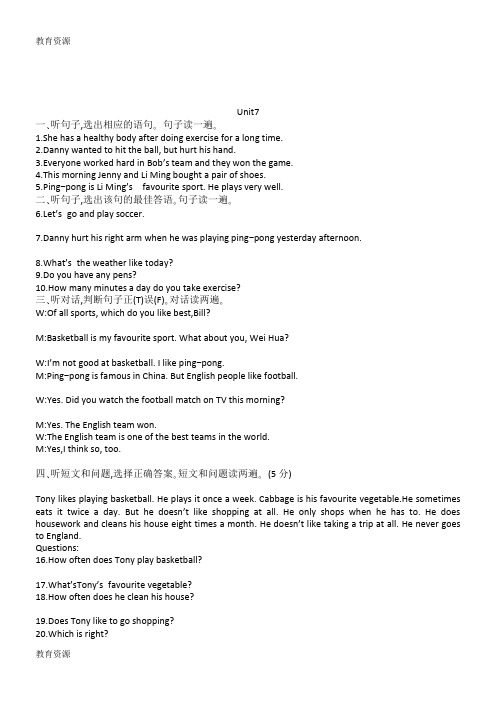
Unit7一、听句子,选出相应的语句。句子读一遍。1.She has a healthy body after doing exercise for a long time.2.Danny wanted to hit the ball, but hurt his hand.3.Everyone worked hard in Bob’s team and they won the game.4.This morning Jenny and Li Ming bought a pair of shoes.5.Ping-pong is Li Ming’s favourite sport. He plays very well.二、听句子,选出该句的最佳答语。句子读一遍。6.Let’s go and play soccer.7.Danny hurt his right arm when he was playing ping-pong yesterday afternoon.8.What’s the weather like today?9.Do you have any pens?10.How many minutes a day do you take exercise?三、听对话,判断句子正(T)误(F)。对话读两遍。W:Of all sports, which do you like best,Bill?M:Basketball is my favourite sport. What about you, Wei Hua?W:I’m not good at basketball. I like ping-pong.M:Ping-pong is famous in China. But English people like football.W:Yes. Did you watch the football match on TV this morning?M:Yes. The English team won.W:The English team is one of the best teams in the world.M:Yes,I think so, too.四、听短文和问题,选择正确答案。短文和问题读两遍。(5分)Tony likes playing basketball. He plays it once a week. Cabbage is his favourite vegetable.He sometimes eats it twice a day. But he doesn’t like shopping at all. He only shops when he has to. He does housewo rk and cleans his house eight times a month. He doesn’t like taking a trip at all. He never goes to England.Questions:16.How often does Tony play basketball?17.What’sTony’s favourite vegetable?18.How often does he clean his house?19.Does Tony like to go shopping?20.Which is right?。
【冀教版】七年级英语下册听力训练(MP3+素材)Unit1(样例5)
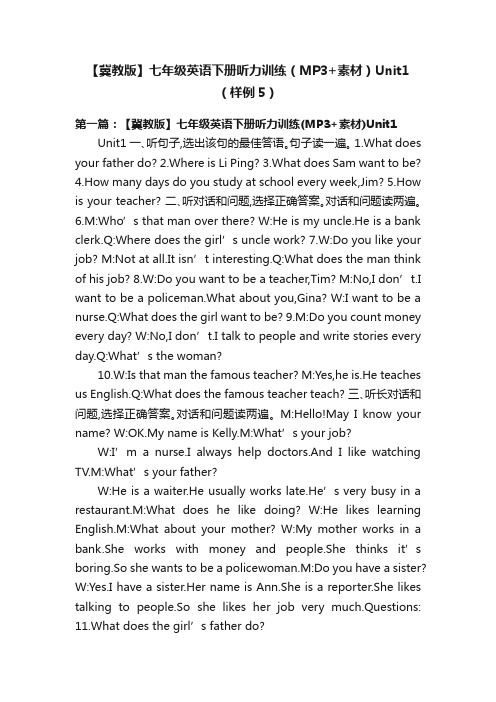
【冀教版】七年级英语下册听力训练(MP3+素材)Unit1(样例5)第一篇:【冀教版】七年级英语下册听力训练(MP3+素材)Unit1 Unit1 一、听句子,选出该句的最佳答语。句子读一遍。 1.What does your father do? 2.Where is Li Ping? 3.What does Sam want to be?4.How many days do you study at school every week,Jim?5.How is your teacher? 二、听对话和问题,选择正确答案。对话和问题读两遍。6.M:Who’s that man over there? W:He is my uncle.He is a bank clerk.Q:Where does the girl’s uncle work?7.W:Do you like your job? M:Not at all.It isn’t interesting.Q:What does the man think of his job?8.W:Do you want to be a teacher,Tim? M:No,I don’t.I want to be a policeman.What about you,Gina? W:I want to be a nurse.Q:What does the girl want to be?9.M:Do you count money every day? W:No,I don’t.I talk to people and write stories every day.Q:What’s the woman?10.W:Is that man the famous teacher? M:Yes,he is.He teaches us English.Q:What does the famous teacher teach? 三、听长对话和问题,选择正确答案。对话和问题读两遍。M:Hello!May I know your name? W:OK.My name is Kelly.M:What’s your job?W:I’m a nurse.I always help doctors.And I like watching TV.M:What’s your father?W:He is a waiter.He usually works late.He’s very busy in a restaurant.M:What does he like doing? W:He likes learning English.M:What about your mother? W:My mother works in a bank.She works with money and people.She thinks it’s boring.So she wants to be a policewoman.M:Do you have a sister? W:Yes.I have a sister.Her name is Ann.She is a reporter.She likes talking to people.So she likes her job very much.Questions: 11.What does the girl’s father do?12.Does the girl’s mother like her work? 13.Where does the girl work? 14.What does the girl like doing? 15.What does the girl’s sister do? 四、听短文,填空。短文读两遍。I go to school from Monday to Friday.We have four classes in the morning and two in the afternoon.We have many things to do after class.On Monday and Wednesday afternoon we have sports.On Tuesday afternoon we have a singing class.On Thursday afternoon we have a drawing class.On Friday afternoon we practice speaking English.第二篇:【人教版】七年级英语上册听力训练(MP3+素材)Unit 9 Unit 9 听力原文: 一、听句子,填写正确的单词。(每个句子听两遍)1.My favorite subject is math.2.Tuesday is his favorite day.3.My art teacher is Mr.Black.4.I think P.E.is very interesting.5.Mike likes art very much.二、听对话,根据内容判断下列各句的正(T)误(F)。(对话听两遍)M:Hi,Mary.W:Hi,Mark.M:What’s your favorite subject,Mary? W:I think Chinese is.M:Really? I think it’s very difficult.I like P.E.W:I like P.E.,too,but I only have P.E.on Wednesday and Friday.M:We can play sports after class in the afternoon.W:What are your favorite sports?M:Soccer and basketball.How about you? W:I like volleyball.三、听句子,选择正确的答语。(每个句子听两遍)11.What’s Mary’s favorite subject? 12.Why does she like art? 13.Is this your pencil?14.When is your birthday,John? 15.How much is this T-shirt?四、听短文,填入所缺的单词。(短文听两遍)We go to school from Monday to Friday.We have four classes in the morning and three in the afternoon.We have many things to do after class.On Monday and Thursday afternoon we have sports.On Wednesday morning some of us have a singing class.On Thursday morning some have math.On Friday afternoon we practice speaking English.第三篇:【人教版】七年级英语上册听力训练(MP3+素材)Unit 5 Unit 5 听力原文: 一、听句子,选择与其内容相符的图片。(每个句子听两遍)1.Let’s play tennis.2.Mary has three baseball bats.3.We can see a football under the table.4.English is very difficult.5.She watches TV every day.二、听对话,根据内容选择正确答案。(对话听两遍)6.M:What do you have in your pencil box,Mary? W:Oh,I have two pencils.7.M:Lily,let’s play soccer.W:That sounds good.Let’s go.8.M:Jenny,I have two basketballs.What about you? W:Oh,I don’t have one.9.M:Are the ping-pong balls in the drawer? W:No,they are on the dresser.10.W:Can you play baseball,Tony? M:No,it’s too difficult.三、听问句,选择正确的答语。(每个句子听两遍)11.Do you have a compute r game? 12.Let’s play basketball.13.Does he like sports?14.Are those your dictionaries? 15.Where are the ping-pong bats?四、听对话,根据内容判断下列句子正(T)误(F)。(对话听两遍)W:Do you like volleyball,Andrew? M:Well,I like soccer and basketball.W:Do you like tennis?M:No,I don’t.Do you,Ann?W:Yes,I do.My sister and I often play tennis.M:What’s her name?W:Her name is Sue and she plays tennis,volleyball and basketball.M:Does she like soccer? W:No,she doesn’t.第四篇:【人教版】七年级英语上册听力训练(MP3+素材)Unit 8 Unit 8 听力原文: 一、听句子,选择正确的图片。(每个句子听两遍)1.My little brother is one year old.2.My father buys me a big birthday cake.3.The cake is on the table.4.Grandma gives Lily a soccer ball for her birthday.5.Bill likes fruit cakes very much.二、听对话,写出你所听到的日期,将其代号填在横线上。(对话听两遍)6.M:When is your birthday,Mary? W:My birthday is on Januaryfifteenth.7.M:When is your birthday,Vera? W:It’s on June fourth.8.M:When is your father’s birthday? W:My father’s birthday is on August fourth.Oh,no,twenty-second.9.M:When is your mother’s birthday? W:My mother’s birthday is on July 4th.10.M:When is Madam Curie’s birthday,do you know? W:It’s on December 7th.三、听对话,选择正确的答案。(对话听两遍)11.M:How old are you,Lingling?W:Eight.My birthday is on August 16th.12.M:It’s September 1st.It’s the first day of school.W:We can see our friends agai n today.13.M:Dudu,when were you born?W:Let me see.I was born on April 12th.M:Oh,I was born on February 3rd.I am older than you.14.M:Lily,do you like apples? W:Yes,I do.M:I have an apple.Here you are.W:Thank you.It’s kind of you.15.M:Hello,this is Tom speaking.W1:Hello,T om.This is Aunt Mary.Is Mum at home? M:Yes,hold on please.Mum!Mum!W2:I’m coming.四、听句子,填入所缺单词,每空一词。(每个句子听两遍)16.My birthday party is on October 5th.17.The basketball game is on October 2nd.18.The school trip is on September 15th.19.When’s the speech contest? 20.He was born on November 21.第五篇:【人教版】七年级英语上册听力训练(MP3+素材)Unit 4 Unit 4 听力原文: 一、听句子,选出你所听到的单词。(每个句子听两遍)1.She has a sister.2.Please bring my schoolbag here.3.His notebook is on the bed.4.This is his math book.5.His books are on the floor.二、听句子,选出能回答该问句的正确答语。(每个句子听两遍)6.Where’s the ball? 7.Is she your friend?8.Where’s your schoolbag? 9.Are the keys under the bed?10.Where are the keys?三、听对话及问题,选出能回答问题的最佳答案。(对话听两遍)11.W:Jeff,where is my eraser? M:Well,it’s under yourbook.Q:Is the eraser on the book?12.W:Is your pencil box on the desk?M:No.My pencil box is in the schoolbag.Q:Where is his pencil box?13.W:Is her computer game on the table? M:Computer game? Oh,yes,it is.Q:Where is her computer game?14.W:Those books aren’t in the bookcase.Where are they? M:Look!They are under your bed.Q:Are those books under her bed? 15.M:Mum,I need my hat.Where is it? W:Here,it is in your dresser.Q:Where is his hat?四、听短文,根据短文内容选择正确答案。(短文听两遍)There is a library in our school.It is near our classroom.It is on the first floor.Our school library is not very big,but it is nice.There are many books in the library.Some are in Chinese.Some are in English.I like reading very much.I often go there to borrow books.The librarian is a woman.She is very kind.We can choose any books from the library.。
冀教版英语七年级下册Unit7:Lesson42KnowYourself教学设计

(一)教学重难点
1.重点:本节课的重点在于使学生掌握描述个人兴趣、特长和梦想的核心词汇和短语,并能运用一般现在时和一般将来时进行自我介绍。
难点:如何引导学生将所学的词汇和语法结构灵活运用到实际情境中,进行流畅的自我表达。
2.重点:培养学生正确认识自我,树立自信,勇敢追求梦想。
冀教版英语七年级下册Unit7:Lesson42KnowYourself教学设计
一、教学目标
(一)知识与技能
在本章节中,学生将掌握以下知识与技能:
1.掌握本课的核心词汇和短语,如“talent”, “dream”, “goal”, “achieve”, “confident”等,并能熟练运用到日常交流中。
1.完成课后练习:请学生完成课本中与本节课相关的练习题,以巩固词汇和语法知识,提高语言运用能力。
要求:认真完成,注意检查,确保作业质量。
2.自我介绍视频制作:学生以小组为单位,运用本节课所学词汇和语法,录制一段自我介绍的视频,内容包括自己的兴趣爱好、特长和梦想。
要求:视频内容丰富,语言表达流畅,尽量使用目标语言。
2.学会使用一般现在时和一般将来时描述自己的兴趣爱好、能力和梦想。
3.能够运用目标语言进行自我介绍,展示个人特长和未来规划。
4.提高学生的听说能力,通过课堂活动和课后练习,使学生能够理解并参与简单的英语讨论。
(二)过程与方法
在本章节的教学过程中,教师将采用以下方法:
1.利用图片、实物和情景模拟等多种教学手段,引导学生积极参与课堂,激发学生的学习兴趣。
3.课后访谈活动:学生采访家人或朋友,了解他们的兴趣爱好、特长和梦想,并记录下来。
要求:采访过程中注意倾听,尊重对方,运用所学知识进行提问和记录。
冀教版七年级英语(下)Unit 7 It's raining! 单元测试卷(二)听力部分C卷
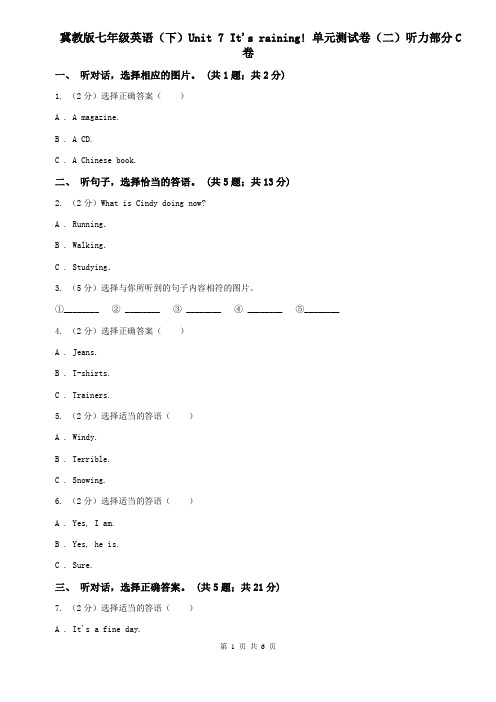
冀教版七年级英语(下)Unit 7 It's raining! 单元测试卷(二)听力部分C卷一、听对话,选择相应的图片。
(共1题;共2分)1. (2分)选择正确答案()A . A magazine.B . A CD.C . A Chinese book.二、听句子,选择恰当的答语。
(共5题;共13分)2. (2分)What is Cindy doing now?A . Running.B . Walking.C . Studying.3. (5分)选择与你所听到的句子内容相符的图片。
①________② ________③ ________④ ________ ⑤________4. (2分)选择正确答案()A . Jeans.B . T-shirts.C . Trainers.5. (2分)选择适当的答语()A . Windy.B . Terrible.C . Snowing.6. (2分)选择适当的答语()A . Yes, I am.B . Yes, he is.C . Sure.三、听对话,选择正确答案。
(共5题;共21分)7. (2分)选择适当的答语()A . It's a fine day.B . It's fine.C . It's Friday.8. (10分)听短文,选择最佳答案。
(1)What time is it now?A . It's 10:00 a.m.B . It's 10:30 a.m.C . It's 11:00 a.m.(2)How's the weather now?A . It's rainingB . It's snowy.C . It's windy(3)What is Frank's father doing?A . Watching TV.B . Writing to his friends.C . Cleaning the house.(4)What is Frank's sister doing?A . Washing her clothes.B . Playing the piano.C . Doing her homework.(5)Where's Frank?A . In the kitchen.B . In the living room.C . In his room.9. (5分)听句子,选择正确的图片A. B. C.D. E.⑴________⑵________⑶________⑷________⑸________10. (2分)选出与其意思相符的图片()A .B .C .11. (2分)How's the weather today?A . It's sunny.B . It's rainy.C . It's cloudy.四、听短文,选择正确答案。
【冀教版】七年级英语下册听力训练(MP3+素材)Unit5-教学文档
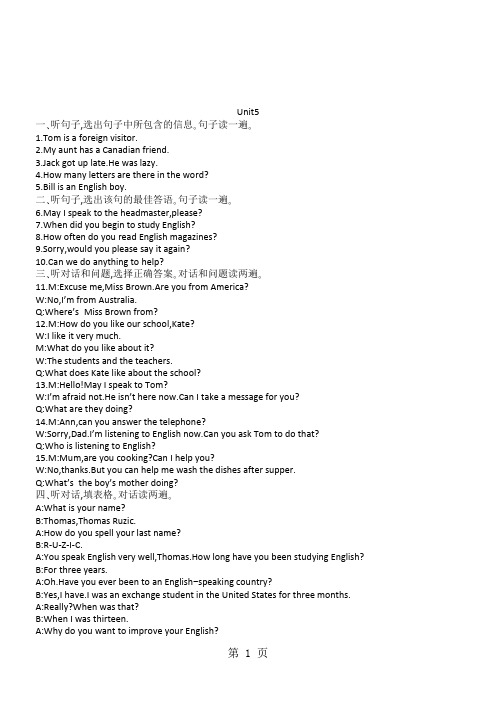
Unit5一、听句子,选出句子中所包含的信息。句子读一遍。1.Tom is a foreign visitor.2.My aunt has a Canadian friend.3.Jack got up late.He was lazy.4.How many letters are there in the word?5.Bill is an English boy.二、听句子,选出该句的最佳答语。句子读一遍。6.May I speak to the headmaster,please?7.When did you begin to study English?8.How often do you read English magazines?9.Sorry,would you please say it again?10.Can we do anything to help?三、听对话和问题,选择正确答案。对话和问题读两遍。11.M:Excuse me,Miss Brown.Are you from America?W:No,I’m from Australia.Q:Where’s Miss Brown from?12.M:How do you like our school,Kate?W:I like it very much.M:What do you like about it?W:The students and the teachers.Q:What does Kate like about the school?13.M:Hello!May I speak to Tom?W:I’m afraid not.He isn’t here now.Can I take a message for you?Q:What are they doing?14.M:Ann,can you answer the telephone?W:S orry,Dad.I’m listening to English now.Can you ask Tom to do that?Q:Who is listening to English?15.M:Mum,are you cooking?Can I help you?W:No,thanks.But you can help me wash the dishes after supper.Q:What’s the boy’s mother doing?四、听对话,填表格。对话读两遍。A:What is your name?B:Thomas,Thomas Ruzic.A:How do you spell your last name?B:R-U-Z-I-C.A:You speak English very well,Thomas.How long have you been studying English? B:For three years.A:Oh.Have you ever been to an English-speaking country?B:Yes,I have.I was an exchange student in the United States for three months. A:Really?When was that?B:When I was thirteen.A:Why do you want to improve your English?B:I want to travel around the world. It’s better to speak English well.。
七年级下册冀教版英语听力

七年级下册冀教版英语听力
English:
The 7th grade textbook for the second semester contains nine units, each with a listening section. These listening exercises cover a range of topics such as daily routines, hobbies, school life, and holidays. Students will listen to conversations, short dialogues, and longer passages, and they will be asked to answer questions or fill in the blanks based on what they hear. The purpose of these listening activities is to help students improve their listening comprehension skills and reinforce the vocabulary and grammar structures they have learned in the textbook.
中文翻译:
七年级下学期的教科书包含了九个单元,每个单元都有一个听力部分。
这些听力练习涵盖了日常生活、爱好、学校生活和假期等各种主题。
学生们将听取对话,短对话和长篇文章,并根据所听到的内容回答问题或填写空白。
这些听力活动的目的是帮助学生提高他们的听力理解能力,并巩固他们在课本中学到的词汇和语法结构。
冀教版七年级英语下册unit7 听力试卷附答案

冀教版七年级英语下册Unit 7 听力(限时: 20分钟满分: 30分)一、听句子, 选出句子中所包含的信息, 每个句子读两遍(每小题1分, 共5分)1. A. usual B. awful C. careful2. A. steps B. habits C. ways3. A. get in the way B. got on the way C. got in the way4. A. Flying a kite is popular.B. Flying a kite is good for us.C. We’re good at flying a kite.5. A. Laughter is good medicine.B. Always take good medicine.C. Medicine can make you laugh.二、听句子, 选出该句的最佳答语, 每个句子读两遍(每小题1分, 共5分)6. A. It is delicious. B. That’s all right.C. Sorry, I won’t.7. A. For a week. B. After a week.C. Once a week.8. A. Yes, I do. B. I never drink.C. It’s good for me.9. A. In 2010. B. Twice a day.C. At three o’clock.10. A. He watched a football game.B. He is going to the store.C. He went to the library.三、听对话和问题, 选出正确答案, 对话和问题读两遍(每小题1分, 共8分)11. What sports does Jim like best?A B C12. How did the people get food a long time ago?A B C13. What does Lin Tao plan to take part in?A. The long jump.B. The high jump.C. Running.14. What does Jim usually eat?A. Fruit.B. Vegetables.C. Meat.15. Why doesn’t Jim take exercise every day?A. He doesn’t like exercise.B. He wants to put on weight.C. He is too busy.16. What is Tom doing?A. Writing a letter.B. Writing a report.C. Writing an e-mail.17. Where does Tom eat breakfast?A. At home.B. At school.C. In a restaurant.18. How often does Tom have milk?A. Three times a week.B. Once a day.C. Twice a day.四、听短文和问题, 选择正确答案, 短文和问题读两遍(每小题1分, 共7分)19. What kind of life did people live a long time ago?A. A healthy and happy life.B. An easy and happy life.C. A healthy and easy life.20. Where do families love to go for holidays now?A. To the mountains.B. To the beaches.C. To the parks.21. What do some people go fishing for now?A. For food.B. For money.C. For fun.22. How is Susan?A. Beautiful.B. Healthy.C. Best.23. Which fruit does Susan like?A. Bananas.B. Apples.C. Pears.24. What food does Susan eat for dinner?A. Salad.B. Eggs and milk.C. Chicken.25. Why doesn’t Susan eat too much ice cream?A. Because it’s very cold.B. She thinks she may be fat.C. She doesn’t like it.五、听短文填空, 短文读两遍(每小题1分, 共5分)Unit 7 听力听力材料:一、1. Playing the computer games all day is awful.2. I decided to change my eating habits.3. Don’t get in the wa y of my work.4. It’s good for us to fly a kite.5. Always laugh, because it is good medicine.二、6. Don’t eat too much junk food.7. How often does the girl come to school on foot?8. Do you often eat vegetables?9. When does the train leave?10. Where did he go last night?三、Dialogue 1W: Do you like sports, Jim?M: Yes, of course I do. I like many sports. I like playing basketball best.Q11: What sports does Jim like best?Dialogue 2M: Did the First Nations people come to Canada a long time ago?W: Yes. They went hunting for their meals at that time.Q12: How did the people get food a long time ago?Dialogue 3W: The School Sports Day is coming. I plan to take part in running and the long jump.What about you, Lin Tao?M: I want to take part in the long jump, too.Q13: What does Lin Tao plan to take part in?Dialogue 4W: Do you like eating vegetables, Jim?M: Yes. I usually eat vegetables and I sometimes eat meat.W: Do you take exercise every day?M: No, I don’t have much time.Q14: What does Jim usually eat?Q15: Why doesn’t Jim take exercise every day?Dialogue 5W: What are you doing, Tom?M: I am writing a report about habits.W: What’s your good habit?M: I often get up early and eat breakfast at home. I have vegetables twice a day, milk once a day and fruit three times a week.W: Oh! It’s good for you. Do you have any bad habits?M: Yes. I often watch TV and don’t have enough sleep.W: You need to do more sports, Tom.Q16: What is Tom doing?Q17: Where does Tom eat breakfast?Q18: How often does Tom have milk?四、Text 1A long time ago, people lived a healthy and happy life. They went fishing and hunting for food. Now people live a rich and happy life. Some people go fishing for fun. Families love to have holidays. They love to go to the beach and enjoy swimming. Many big cities have many shops and hotels for the visitors.Q19: What kind of life did people live a long time ago?Q20: Where do families love to go for holidays now?Q21: What do some people go fishing for now?Text 2 Susan is my best friend. She isn’t very beautiful, but she is very healthy. She has good eating habits. She likes fruit best. It’s healthy. She doesn’t like bananas, but she likes apples. She has salad for lunch. She doesn’t have hamburg ers for dinner, because she thinks they’re not healthy. Chicken is good for health, so she often eats it for dinner. She likes ice cream, too. She doesn’t eat too much. She thinks she may be fat.Q 22: How is Susan?Q23: Which fruit does Susan like?Q24: What food does Susan eat for dinner?Q25: Why doesn’t Susan eat too much ice cream?五、Dale is my best friend. He is very healthy because he has a good habit. He usually gets up at 6:30. Then he goes to school at 7 o’clock. He works hard at school. Afte r school, he gets some exercise in the park with his friends for about half an hour. Then he goes home at 5:30. In the evening, he always does his homework after dinner. He sometimes watches TV or reads newspapers. He usually goes to bed at 9:40.答案:一、1~5: BBABA二、6~10: CCACC三、11~13: CAA 14~15: BC 16~18: BAB四、19~21: ABC 22~25: BBCB五、26. habit 27. 6:30 28. gets some exercise29. homework 30. newspapers。
冀教版英语七年级下册unit7教案
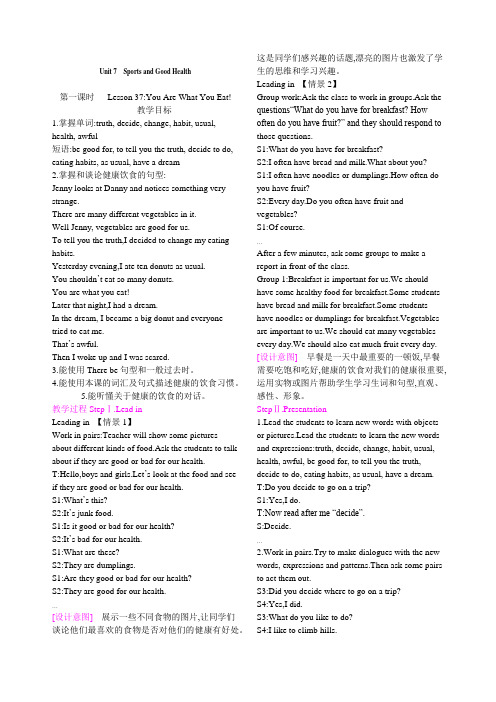
Unit 7Sports and Good Health第一课时Lesson37:YouAreWhatYouEat!教学目标1.掌握单词:truth,decide,change,habit,usual,health,awful短语:begoodfor,totellyouthetruth,decidetodo,eatinghabi ts,asusual,haveadream2.掌握和谈论健康饮食的句型: JennylooksatDannyandnoticessomethingverystrange. Therearemanydifferentvegetablesinit.WellJenny,vegetablesaregoodforus. Totellyouthetruth,Idecidedtochangemyeatinghabits. Yesterdayevening,Iatetendonutsasusual. Youshouldn’teatsomanydonuts. Youarewhatyoueat!Laterthatnight,Ihadadream.Inthedream,Ibecameabigdonutandeveryonetriedtoeat me.That’sawful.ThenIwokeupandIwasscared.3.能使用Therebe句型和一般过去时。
4.能使用本课的词汇及句式描述健康的饮食习惯。
5.能听懂关于健康的饮食的对话。
教学过程StepⅠ.LeadinLeadingin 【情景1】Workinpairs:Teacherwillshowsomepicturesaboutdiff erentkindsoffood.Askthestudentstotalkaboutiftheyare goodorbadforourhealth.T:Hello,boysandgirls.Let’slookatthefoodandseeifthey aregoodorbadforourhealth.S1:What’sthis?S2:It’sjunkfood.S1:Isitgoodorbadforourhealth?S2:It’sbadforourhealth.S1:Whatarethese?S2:Theyaredumplings.S1:Aretheygoodorbadforourhealth?S2:Theyaregoodforourhealth.…[设计意图]展示一些不同食物的图片,让同学们谈论他们最喜欢的食物是否对他们的健康有好处。
【初一英语试题精选】七年级下册英语Unit7单元练习含听力录音mp3(冀教版)
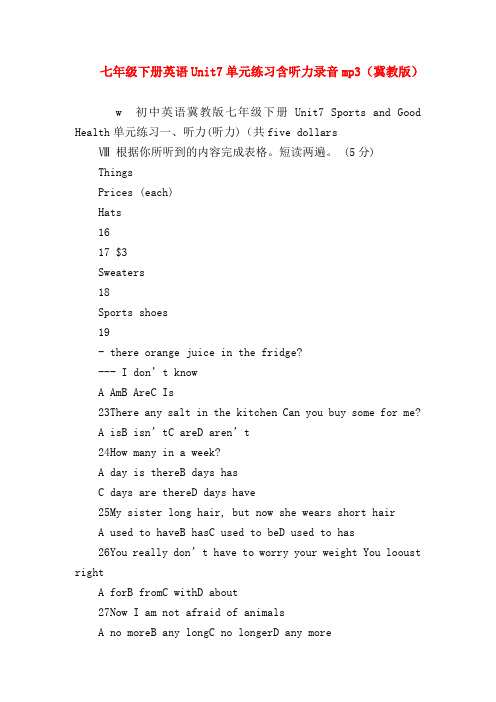
31It is necessary for everyone to a good habit of reading
A enjoyB chooseC developD accept
32This kind of shoes will keep you when you take a walk
Sweaters
18
Sports shoes
19
- there orange juice in the fridge?
--- I don’t know
A AmB AreC Is
23There any salt in the kitchen Can you buy some for me?
A isB isn’tC areD aren’t
26You really don’t have to worry your weight You looust right
A forB fromC withD about
27Now I am not afraid of animals
A no moreB any longC no longerD any more
A fortsB fortablyC fortD fortable
三、完形填空(共10小题;共15分)
How can we stay healthy? One important rule is to exercise 33 The Fang family try to exercise every day Lee Fang 34 exercise in the morning because he must be at his job at exactly(精确地) seven o’clock But he runs every evening He would rather(宁愿) run than watch TV He walks a lot, 35 He walks to school every day, and after school he 36 basketball with his friends Lee Fang goes to a yoga(瑜伽) class 37
冀教版七年级英语下册Unit7全单元教案
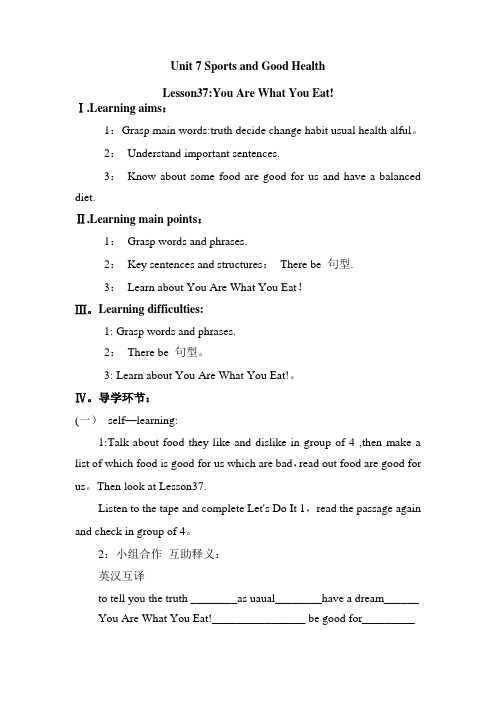
Unit 7 Sports and Good HealthLesson37:You Are What You Eat!Ⅰ.Learning aims:1:Grasp main words:truth decide change habit usual health alful。
2:Understand important sentences.3:Know about some food are good for us and have a balanced diet.Ⅱ.Learning main points:1:Grasp words and phrases.2:Key sentences and structures:There be 句型.3:Learn about You Are What You Eat!Ⅲ。
Learning difficulties:1: Grasp words and phrases.2:There be 句型。
3: Learn about You Are What You Eat!。
Ⅳ。
导学环节:(一)self—learning:1:Talk about food they like and dislike in group of 4 ,then make a list of which food is good for us which are bad,read out food are good for us。
Then look at Lesson37.Listen to the tape and complete Let's Do It 1,read the passage again and check in group of 4。
2:小组合作互助释义:英汉互译to tell you the truth ________as uaual________have a dream______ You Are What You Eat!________________ be good for_________饮食习惯醒来谚语Complete Let’s Do It 2 then read the paassage loudly and check. (二)展示交流:小组展示:Complete Let's Do It 4讨论如何培养良好的饮食习惯,怎样关爱健康?(三)拓展提升:反馈矫正:Complete Let's Do It 3and check in group of 4.(四)课堂作业:1:朗读课文.2:复习课堂中自己掌握不够彻底的知识。
英语初一下冀教版unit7全单元教案
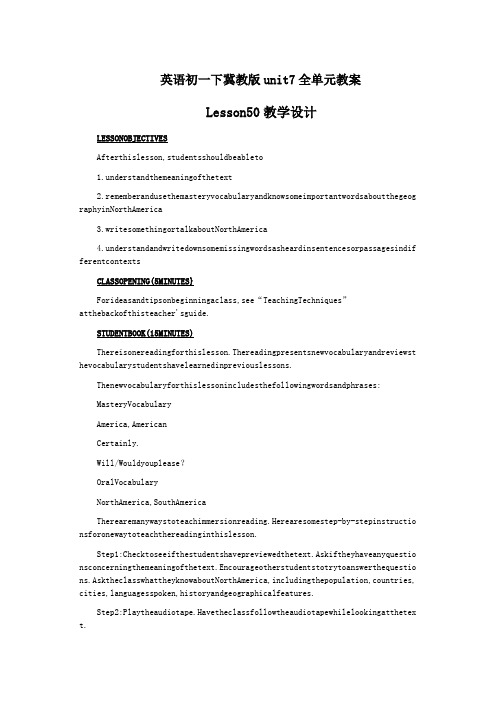
英语初一下冀教版unit7全单元教案Lesson50教学设计LESSONOBJECTIVESAfterthislesson,studentsshouldbeableto1.understandthemeaningofthetext2.rememberandusethemasteryvocabularyandknowsomeimportantwordsaboutthegeog raphyinNorthAmerica3.writesomethingortalkaboutNorthAmerica4.understandandwritedownsomemissingwordsasheardinsentencesorpassagesindif ferentcontextsCLASSOPENING(5MINUTES}Forideasandtipsonbeginningaclass,see“TeachingTechniques”atthebackofthisteacher'sguide.STUDENTBOOK(15MINUTES)Thereisonereadingforthislesson.Thereadingpresentsnewvocabularyandreviewst hevocabularystudentshavelearnedinpreviouslessons.Thenewvocabularyforthislessonincludesthefollowingwordsandphrases:MasteryVocabularyAmerica,AmericanCertainly.Will/Wouldyouplease?OralVocabularyNorthAmerica,SouthAmericaTherearemanywaystoteachimmersionreading.Herearesomestep-by-stepinstructio nsforonewaytoteachthereadinginthislesson.Step1:Checktoseeifthestudentshavepreviewedthetext.Askiftheyhaveanyquestio nsconcerningthemeaningofthetext.Encourageotherstudentstotrytoanswerthequestio ns.AsktheclasswhattheyknowaboutNorthAmerica,includingthepopulation,countries, cities,languagesspoken,historyandgeographicalfeatures.Step2:Playtheaudiotape.Havetheclassfollowtheaudiotapewhilelookingatthetex t.Step3:Discussthereadingwiththeclass.Asktheclasstosummarizethemainideasoft hetext.Makesurethestudentsknowthesixmainpoints(thesixquestionsintroducingeach paragraph)discussedinthetext.Step4:Dividetheclassintosmallgroups.Haveeachgroupdotheoneoffollowingactiv ities:drawamapofNorthAmerica,roughlyindicatinginEnglishthecountries,majorciti esandmountainsthestudentsknow;ordiscussthereading,usingasmuchEnglishaspossibl e.Theirdiscussionscouldcentrearoundquestionssuchas:WhattwocountriesareinNorthAmerica?(CanadaandtheUnitedStates)ThenameSouthAmericagivesyouaclueastothiscountry'slocation.WhereisSouthAmericalocated?(ItislocatedsouthofNorthAmerica.)CLASSACTIVITY:WORDGAMES(15MINUTES)Havetheclassplayagameasafunwaytolearnthevocabularyforthislesson.Youcanuse thisasanopportunitytoreviewlearnedvocabularyaswell.See“Games”atthebackofthisteacher'sguideforanalphabeticallistofgameswithinstructionsonho wtoplay.Chooseoneofthesesuggestedgamesforlearningvocabulary:“Bingo”(studentsmatchwordsontheirgamesheetstowordsonvocabularycards)“DrawandGuess”(studentsdrawpicturestoillustrateswordsorphrases)“SpellingBee”(studentsplayinteams,winningpointsforcorrectlyspellingwords)Youcanalsocutthisactivityandassignsometimefordiarywritingorgroupverb-tens estudies.RemembertocheckinontheseactivitiesattheendofLesson55or56(orboth).ACTIVITYBOOK(5MINUTES)Playtheaudiotape.Theauralexercisesforthislessonare:1.Listentotheaudiotape.Fillintheblanks.Writethewordsyouhear.ASmartMother,PartTwoTashaandherchildrenareinthebackofthehouse!Garyrunsintothehouse.Thereisalo tofwaterinthehouse.WhereisTasha?Theresheis!Sheisswimming.Whereareherchildren?Theyareinadish.ItisTasha'sfooddish.Thed ishislikeaboat!Tashaispushingthedishwithhernose.Thesmalldogshaveasmartmother.CLASSCLOSING(5MINUTES)Belowisthesuggestedhomeworkforthislesson.eyourdiscretionindeciding howmuchreadingorhowmanyexercisestoassignashomework.Baseyourdecisiononstudents'progress.thesecondreadinginthereadertheremainingactivitybookexercisesthenextlessoninthestudentbookLesson51教学设计LESSONOBJECTIVESAfterthislesson,studentsshouldbeableto1.understandthemeaningofthetext2.rememberandusethemasteryvocabularyandknowsomeimportantwordsaboutthecoun triesinAsia3.writesomethingortalkaboutAsiancountries4.understandandwritedownsomemissingwordsasheardinsentencesorpassagesindif ferentcontextsCLASSOPENING(5MINIITES)Forideasandtipsonbeginningaclass,see“TeachingTechniques”atthebackofthisteacher'sguide.STUDENTBOOK(15MINUTES)Therearetworeadingsforthislesson.Teachthefirstreading.Thesecondreadingisf orstudentstouseindependently.Thereadingspresentnewvocabularyandreviewvocabularythestudentshavelearnedi npreviouslessons.Thenewvocabularyforthislessonincludesthefollowingwordsandphr ases:MasteryVocabularyabroad,Japanese,town,villageOralVocabularyAfrica,Asia,India,JapanBeforeyoubeginthereading,introducetheunitproject.See“TeachingTechniques”atthebackOfthisteacher'sguideforgeneralinformationaboutintroducingunitprojects.AlsoseetheUnit7introductorypageinthisteacher'sguide.Instructionsforunitproject1areinthestudentbook.Therearemanywaystoteachimmersionreading.Herearesomestep-by-stepinstructionsforonewaytoteachthereadinginthislesson.Step1:Checktoseeifthestudentshavepreviewedthetextasrequired.Askiftheyhave anyquestionsconcerningthemeaningofthetext.Encourageotherstudentstotrytoanswer thequestions.AskthemiftheyknowanythingaboutcountriesinAsia,otherthanChina,and includingJapanandIndia.Step2:Playtheaudiotape.Havetheclassfollowtheaudiotapewhilelookingatthetex eyourjudgmenttodecidewhetheryouwanttospendsometimeonanyofthenewwords.Youm ightselectoneortwowordsfromthevocabularylistandaskifanyonehasfiguredoutthemea ning.Ifastudentrepliescorrectly,askhimorhertosharethestrategiesusedtopuzzleou tthemeanings.Remembertogivelotsofpraiseforagoodtry,evenifit'swrong.Step3:AskforvolunteerstotakeontherolesofJenny,BrianandDannyandactoutthere adinginanywaytheychoose.Stop4:Dividetheclassintosmallgroups.Askallthegroupstohaveadiscussionaroun doneofthefollowingtopics.RemindstudentstouseasmuchEnglishaspossible.Countries 1wouldliketovisitWhatIknowaboutAsiancountriesLanguagesspokeninAsiaUNITPROJECT:REGIONALREPORT(15MINUTES)Beginunitproject.Thisprojectcoversfourlessons.Studentswillprepareareportt opresenttotheclass.Dividetheclassintosmallgroups.Haveeachgroupchoosearegionof theworld.Workingintheirgroups,studentsbegintocollectfactsabouttheregion.Instr uctthemtorefertothestudentbookandreader.TEACHINGTIPDisplaycentresarefun!Thiswouldbeagoodprojectforthestudentstomakedisplaycentres.Eachgroupcouldcreateadisplayaboutitsregioninadifferentareaoftheclassroom, theycandisplaymaps,writteninformationandanypicturesorobjectstheyhavemanagedto find.Onpresentationday,onememberofeachgroupstayswiththedisplayashosttoexplain it.Therestofthestudentswalkaroundtheclassroomtovisiteachcentre,Studentscantak eturnsashostoftheirgroup'sdisplaycentre.ACTIVITYBOOK(5MINUTES)Playtheaudiotape.Theauralexercisesforthislessonare:1.Listentotheaudiotape.Fillintheblanks.Writethewordsyouhear.IntheCity,PartOneAwomangoestothecityforthefirsttime.Sheseesmanycars,lightsandtallbuildings .Sheissearedofthecars.Shehasneverseensomanycars!Shewalksintoabigofficebuildin g.Itisquietthere.Shelooksaround.Sheseesanold,oldmanwithgrayhair.Heisstandingi nfrontoftwodoors.Hepushesabutton.Thedoorsopen.Hewalksinsideandthetwodoorsclos e.CLASSCLOSING(5MINUTES)Belowisthesuggestedhomeworkforthislesson.eyourdiscretionindeciding howmuchreadingorhowmanyexercisestoassignashomework.Baseyourdecisiononstudents 'progress.thethirdreadinginthereadertheremainingactivitybookexercisesthenextlessoninthestudentbookLesson52教学设计LESSONBOJECTIVESAfterthislesson,studentsshouldbeableto1.understandthemeaningofthesongandsingitwell2.rememberandusethemasteryvocabulary3.understandandwritedownsomemissingwordsasheardinsentencesorpassagesindif ferentcontextsCLASSOPENING(5MINUTES)Forideasandtipsonbeginningaclass,see“TeachingTechniques”atthebackofthisteacher'sguide.STUDENTBOOK(5MINITTRS)Thereisonereadingforthislesson.Thereadingpresentsnewvocabularyandreviewst hevocabularystudentshavelearnedinpreviouslessons.Thenewvocabularyforthislessonincludesthefollowingwordsandphrases:MasteryVocabularyThanksalot!You'rewelcome.Sure!Certainly!OralVocabularyThereisnoneworalvocabularyinthislesson.Therearemanywaystoteachimmersionreading.Herearesomestep-by-stepinstructio nsforonewaytoteachthereadinginthislesson.Step1:Checktoseeifthestudentshavepreviewedthetextasrequired.Askiftheyhave anyquestionsconcerningthemeaningofthetext.Encourageotherstudentstrytoanswerth equestions.Step2:Playtheaudiotape.Havetheclassfollowtheaudiotapewhilelookingatthetex t.Selectoneortwosentencescontainingkeyphrases,expressionsandsentencepatterns. Askifanyonehasfiguredoutthemeaning.Ifastudentrepliescorrectly,askhimorhertosh arethestrategiesusedtopuzzleoutthemeanings.Remembertogivelotsofpraiseforagood try,evenifit'swrong.Step3:Dividetheclassintogroupsoffour.Eachgroupmemberwillplayoneofthefourr oles(Jenny,Brian,LiMing'smotherandLiMing).Thestudentscanactoutthereadinginanywaytheychoose.Haveonegroupperformforth erestoftheclass.Step4:Iftimeallows,easmuchEnglishaspossib le.Askquestionstomakeiteasierforstudentstoparticipateinthediscussion.Askquest ionssuchas:WhatdoesBriansaythatmeansthesamethingascallonthetelephone?(Hesays “ringup.”)Whatcouldyousayinsteadof“Thanksalot”?(Thanks,thankyou,thanksverymuch,thankyouverymuch.)UNITPROJECT:REGIONALREPORT(CONTINUED)(15MINUTES)Continueunitproject.Studentscontinuetoworkinthesamegroups.Instructthegrou pstobeginwritingtheirreports.Advisestudentsthattherewillbetimeinthenextlesson tofinishtheirreports.Remindthegroupstothinkaboutillustrationsfortheirpresenta tions.Cantheydrawamapoftheirregion?Cantheylocatecitiesandotherfeaturesonthema p?Studentsmayrefertothestudentbookandreaderforinformation.ACTIVITYBOOK(5MINUTES)Playtheaudiotape.Theauralexercisesforthislessonare:1.Listentotheaudiotape.Followthedirections,a.Listen.Fillintheblanks.Writetilewordsyouhear.IntheCity,PartTwoTherearenumbersoverthedoors.Thenumberschange:1,2,3,4,5.Thenthenumberschan geagain:5,4,3,2,1.Thedoorsopenagain.Agoodlookingyoungmanwithblackhairwalksout !Thewomanisverysurprised.Shesays,“My!That'sverygood!Tomorrow,I'mgoingtobringmyhusband!”CLASSCLOSING(5MINUTES)Thereisnospecificreadingfromthereadertoassignashomeworkforthislesson.This isachanceforstudentstocatchupiftheyarebehind.Suggestedhomeworkforthislessonincludes:theremainingexercisesintheactivitybookthenextlessoninthestudentbookdiarywritingandgroupverb-tensestudiesLesson53教学设计LESSONOBJECTIVESAfterthislesson,studentsshouldbeableto1.understandthemeaningofthetext2.rememberandusethemasteryvocabularyandknowsomeimportantwordsformakingpho necalls3.understandandwritedownsomemissingwordsasheardinsentencesorpassagesindif ferentcontextsCLASSOPENING(5MINUTES)orideasandtipsonbeginningaclass,see “TeachingTechniquesatthebackofthis,teacher’sguide.Youmaywishtohavetheclasssing“EastWeGo.”STUDENTSNTBOOK(15MINUTES)Thereisonereadingforthislesson.Whileyouareencouragedtouseyourownwaysoftea ching,youcouldfollowthestepsoutlinedbelow.Step1:Checktoseeifthestudentshavepreviewedthetextasrequired.Askiftheyhave anyquestionsconcerningthemeaningofthetext.Step2:Playtheaudiotape,whichteachesthevocabularyforthislesson.Thenewmaste ryvocabularyforthislessonis:ringupHoldon,please.Thisisspeaking.How’stheweatherin?Notethereisnoneworalvocabularyforthislesson.Hereyoumaywanttomentionsomeotherimportantphrases,expressionsandsentencepa tternsinthetext,including:areportonsomethingtogetreadyforsomethingMayIpleasespeakto…?Thereis...speaking.Step3:Action!Dividetheclassintogroupsoffour.Eachmemberplaysoneofthefourro les(Jenny,Brian,LiMing'smotherandLiMing).Thestudentscanactoutthereadinginanyw aytheychoose,haveonegroupperformfortherestoftheclass.Step4:Iftimeallows,easmuchEnglishaspossib le.Askquestionstomakeiteasierforstudentstoparticipateinthediscussion.Askquest ionssuchas:WhatdoesBriansaythatmeansthesamethingas“callonthetelephone”?(Hesays “ringup,”)Whatcouldyousayinsteadof“Thanksalot”?(Thanks,thankyou,thanksverymuch,thankyouverymuch.)UNITPROJECT:REGIONALREPORT(CONTINUED)(15MINUTES)Continueunitproject.Studentscontinuetoworkinthesamegroups.Theycontinuetow orkontheirreports.Encouragethegroupstoaddinformationtotheirreportsthatisnotin thestudentbookorreader.Forexample,studentsmayknowoffamousplacesintheirregiono runusualanimalsthatlivethere.Advisestudentstofinishtheirreportsinthislesson.T heywillbepresentingtheirreportsinthenextlesson.ACTIVITYBOOK(5MINUTES)Playtheaudiotape.Theauralexercisesforthislessonare:1.Listentotheaudiotape,choosethecorrectanswers.1.Iliveinaplacethatisbiggerthanavillageandsmallerthanacity.Whatisit?2.Thiscouldholdmanyofmyschoolbooks.ButInevertakeittoschool.Iuseitonlywhe nIgoonatrip.Whatisit?3.Whenldrivemycar,Iamadriver.Whenltravelonanairplane,Iamoneofthese.4.Bikes,cars,airplanesandbusseshavethese.Whatarethey?5.Youcandothistostairsandairplanes.CLASSCLOSING(5MINUTES)Belowisthesuggestedhomeworkforthislesson.Aimtogivestudentsaboutthirtyminu eyourdiscretionindecidinghowmuchreadingorhowmanyexercisestoas signashomework.Baseyourdecisiononstudents'progress.thefourthreadinginthereadertheremainingactivitybookexercisesthenextlessoninthestudentbookLesson54教学设计LESSONOBJECTIVESAfterthislesson,studentsshouldbeableto1.understandthemeaningofthetext2.rememberandusethemasteryvocabularyandknowsomeimportantwordsaboutEurope3.writesomethingortalkaboutEurope4.understandandwritedownsomemissingwordsasheardinsentencesorpassagesindif ferentcontextsCLASSOPENING(5MIUNTES)Forideasandtipsonbeginningaclass,see“TeachingTechniques”atthebackofthisteacher'sguide.Youmaywishtohavetheclasssing“EastWeGo.”STUDENTBOOK(15MINUTES)Thereisonereadingforthislesson.Thereadingpresentsnewvocabularyandreviewst hevocabularystudentshavelearnedinpreviouslessons.Thenewvocabularyforthislesso nincludesthefollowingwordsandphrases:MasteryVocabularyEngland,Russian,sea,theOralVocabularyBritain,Europe,Germany,RussiaTherearemanywaystoteachimmersionreading.Herearesomestep-by-stepinstructionsforonewaytoteachthereadinginthislesson .Step1:Checktoseeifthestudentshavepreviewedthetextasrequired.Askiftheyhave anyquestionsconcerningthemeaningofthetext.Encourageotherstudentstotrytoanswerthequestions.AskthestudentsiftheyknowanythingaboutEurope,includingitspopulati on,countries,language,majorcities,mountainsandrivers.Step2:Playtheaudiotape.Havetheclassfollowtheaudiotapewhilelookingatthetex t.Step3:Dividetheclassintosmallgroups.EachgroupdrawsamapofEurope.Themapshou ldincludeallthecountries,seas,rivers,mountains,capitalcitiesandlanguagesspoke nthathavebeenmentionedinthetext.EncouragethestudentstouseEnglishintheirdiscussionandmapping.UNITPROJECT:REGIONALREPORT(CONTINUED)(15MINUTES)Concludeunitproject.Groupspresenttheirworktotheclass.Dependingonclasssize andthelengthofpresentations,youmaywishtodivideuptheclass.Groupswouldthenprese nttheirprojectstoorportionoftheclass.ACTIVITYBOOK(5MINUTES)Playtheaudiotape.Theauralexercisesforthislessonare:l.Listentotheaudiotape.Choosethecorrectanswers.1.Jenny:What'stheweatherliketoday?Brian:It'scold.It'ssnowing.2.Danny:What'stheweatherliketoday?Brian:It'scold.Theleaveshavemanycolors.3.Danny:What'stheweatherliketoday'?Brian:It'shot!Let'sgototheswimmingpool.4.Jenny:What'stheweatherliketoday?Danny:Itisrainyandcold.5.Brian:What'stheweatherliketoday?Danny:Itiswarm.Therearenewleavesonthetrees.CLASSCLOSING(5MINUTES)Belowisthesuggestedhomeworkforthislesson,Aimtogivestudentsaboutthirtyminu eyourdiscretionindecidinghowmuchreadingorhowmanyexercisestoas signashomework.Baseyourdecisiononstudentsprogress.thefifthreadinginthereadertheremainingactivitybookexercisesthenextlessoninthestudentbookLesson55教学设计LESSONOBJECTIVESAfterthislesson,studentsshouldbeableto1.understandthemeaningofthetext:il2.memorizewhatisreviewedinthisless03.understandandwritedownsomemissingwordsasheardinsentencesorpassagesindif ferentcontextsCLASSOPENING(5MINUTES)Forideasandtipsonbeginningaclass,see “TeachingTechniquesatthebackofthis,teacher’sguide.Youmaywishtohavetheclasssing“EastWeGo.”STUDENTSBOOK(15MINUTES)Thereisonereadingforthislesson.Itreviewsthevocabularyforthisunit.Thereisn onewvocabularyinthislesson.Therearemanywaystoteachimmersionreading.Herearesom estep-by-stepinstructionsforonewaytoteachthereadinginthislesson.Alsosee “TeachingTechniques”atthebackofthisteacher'sguideformoregeneralinformationaboutteachingreadings.Step1:Checktoseeifthestudentshavepreviewedthetextasrequired.Askiftheyhave anyquestionsconcerningthemeaningofthetext.Encourageotherstudentstotrytoanswer thequestions.Youmaywishtoselectoneortwowordsorphrasesfromthenewvocabularyfort hisunitforreview.Askstudentstotellyouwhatthesewordsandphrasesmean.Ifastudentr epliescorrectly,askhimorhertosharethestrategiesusedtopuzzleoutthemeanings.Rem embertogivelotsofpraiseforagoodtry,evenifit'swrong.Step2:Playtheaudiotape,Havetheclassfollowtheaudiotape.Step3:Dividetheclassintosmallgroups.Havethestudentstalkaboutwritingane-ma ilmessagetoJennyreportingonwhattheyhavelearnedinthisunit.Inparticular,whatsho uldtheyincludeintheirreports?GRAMMARANDVERBS(20MINUTES)GrammarThegrammarforthislessonisarticlesandpropernouns.Anarticleisaspecialtypeof adjective.“A”,“an”and“the”arearticles.Insentences,articlesarealwaysplacedbeforeanoun.Apropernounisaspec ialtypeofnoun.Itisthenameofsomethingandalwaysstartswithacapitalletter.ArticlesTherearetwokindsofarticles:indefiniteanddefinite.“A”and“an”areindefinitearticles.Definite.“A”and“an”eindefinitearticleswhentalkingaboutsomethingsingular( onething)ingeneral.Forexample:Iwantanapple.(anyapple)Acheetahisakindofcat.(cheetahsingeneral)Notethatyoudonotusearticlesintheexpression“kindof.”Yousay“akindofcat,”youdonotsay“akindofacat.”Givetheruleforusing“an”insteadof“a.”“An”isusedforwordsthatbeginwithvowels:A,E,I,OorU.Itmakesthemeasiertopronounce.For example:ananimalaneraseranideaanorangeanumbrellaThe“edefinitearticlesforthefollowingsituations:1.Whentalkingaboutsomethingmentionedearlier.Forexample:Hepickedupabookand readthebook.Notethatthearticle”a“isusedwiththefirstmentionof”book“,butthearticle”the“isusedwiththefollowingmentionof”book.“2.Whentalkingaboutsomethingthatthelistenerknows.Forexample:Openthedoorplease.Inthiscase,youarenottalkingaboutanydoor.Youaretalkingaboutaspecificdoor.Thelistenerknowswhichdooryoumean.3.Whenusingwithcertainpropernouns.Forexample:TheshipsailedonthePacificOce an.Inthiscase,wesay”the“PacificOcean,not”a“PacificOcean.Why?BecausethereisonlyonePacificOcean,althoughitisoneofmanyoceans.4.Whenusingwithpluralsofnouns.Forexample:Ablackcatisatthedoor.BUT,theblackcatsareatthedoor.ProperNounsparethefollowing:NounProperNouncountryChinagirlJennylanguageEnglishArticlescanbeusedwithanyofthenounslisted:acountry,thecountry,agirl,thegir landsoon.Articlesreusedwithonlysomepropernouns.Remembertheaboveexampleusingth ePacificOcean?Butwesay”China,“nottheChina.Why?BecauseChinaisunique.ThePacificOceanisoneofmanyoceans,sowes pecifytheoceanwemean.ButthereisonlyoneChina,sowedon'tneedtospecifyorusethewor d”the.“”NotethatwesaytheUnitedStatesortheUS.AndtheUnitedKingdomortheU.K.Why?Forth esamereason:therearemanystatesintheworld(”states”canmean“country”,sowespecifywhichonewemean:theUnitedStates.Andtheworldhasmanykingd oms,sowespecifywhichonewemean:theUnitedKingdom.VerbsReviewtheverbsforthislesson.Notethat”know“isanirregularverb.Itistheonlyverbtoreviewforthislesson,soifyouhavetime,youm aywishtoreviewotherirregularverbsaswell.Pleasereadaboutteachingverbsin”TeachingTechniques“atthebackofthisguide.ACTIVITYBOOK(5MINUTES)Playtheaudiotape.Theauralexercisesforthislessonare:1.Listentotheaudiotape.Fillintheblanks.Writethewordsyouhear.Help!ICan'tFindMyApartment!PartOneEriklivesinNorway.Helivesinthecountry.HelikesNorway,buthedoesn'tliketheco untry.Hewantstoliveinthecity.ErikgoestoOslo.Osloisabigcity.Heseesaniceapartment.Hebuystheapartment.Erikishungry.Hegoestoarestaurant.Heeatslunch.Alterlunch,Erikwantstogobacktohisnewapartment.Butwhereishisapartment?Allt hebuildingslookthesame.Hecan'trememberwherehisis!CLASSCIOSING(5MINUTES)Thereisnospecificreadingfromthereadertoassignashomeworkforthislesson.This isachanceforstudentstocatchupiftheyarebehind.Theyshouldalsocompleteanyremaini ngexercisesfromtheactivitybook.Lesson56教学设计LESSONOBJECTIVESSincethisisalessonofreview,bytheendoftheclass,studentsshouldbeableto1.understandandrememberwhatisreviewedinthislesson2.haveaclearideaofwhathasbeencoveredinthisunit,includingthetheme(s),activ ities,vocabulary,phrasesandexpressions,grammar,listeningandphoneticsewhathasbeenlearnedinthisunitintheirfreetalksandwritingsaboutgeograph yCLASSOPENING(5MINIITES)Forideasandtipsonbeginningaclass,see”TeachingTechniques “atthebackofthisteacher'sguide.Youmaywishtohavetheclassstag”EastWeGo.“QUIZ(15MINUTES)Playtheaudiotapeforthequiz.Thequizreviewsphrasesandvocabularyteamedinthis unit.Donotusethelistofvocabularyinthislessontodrillstudents!Thepurposeofthelis tistohelpstudentslearnmasteryvocabularyastheyread.Watchyourstudentscloselyduringthequiz.Thequizisachanceforyoutoidentifystu dentswhomaybehavingparticularproblems.Itisalsoachanceforyoutoassessthegeneral progressofyourclass.Arethestudentsgenerallyabletofollowtheaudiotape?Ifyoufindstudentshavetroublewithpartsofthequiz,discussthepoints,andthen,i ftimeallows,playthequizagain.Theaudiotapepresentsboththequestionsandanswersforthequiz:1.IamgoingtocallDannyonthephone.Lookatthesentencesbelow.What'sanotherwaytosay”callonthephone“?It'swhatIusuallysay!Pleasesayitwithme.(I'mgoingtohangupthephone.)(I'mgoingtoringupDanny.)(I'mgoingtowakeupDanny.)2.Thephoneisringingnow.Someonesays,”Hello?”WhatcanIsaynext?Whenyouheartherightanswer,pleasesay“right!”(Timetogo!)(Hello!ThisisBrianspeaking.)(Excuseme,wouldyoupleasehangup?)3.NowIsay,“MayIspeaktoDanny,please?”Thepersonanswers,“Holdon,please.”Why?Whenyouheartherightanswer,pleaseputupyourhand.(BecauseI'malreadytalkingto Danny.)(BecauseI'mnottalkingtoDanny.)4.Pleasesaythiswithme:”Jenny,wouldyoupleasehelpmewithmygeographyhomework?“WhatdoesJennysay?I'mgoingtosayfouranswers.Threeofthemareright.Pleaserepea ttherightanswersafterme.(Certainly!)(No,Ialreadydidmyhomework.)(Sure,Brian!)(Ofcourse!)5.Jennysays,”You'rewelcome.“Why?WhatdidIsaytoJenny?Pleaseputupyourhandfortherightanswer.(Thanksalot.)(I'msorry,butIdon'twanttoreadthatbook.)(Willyoupleasebringmeamap?)6.IhaverungupmymotherinEngland.Ihaveaskedheraquestion.Hereisheranswer:”It'srainytoday,Brian.Itookmyumbrellatowork.“Whatwasmyquestion?Whenyouhearit,pleasesmile!(Howareyou,Mum?)(Imissyou.Doyoumissme?)(How'stheweatherinEngland?)7.Jennyhasamap.IneedJenny'smapformygeographyreport.AmIaskingtherightquest ion?Pleasesay”yes“or”no.“(Wouldyoupleaseletmeseeyourmap,Jenny?)8.Listen.WhatamItalkingabout?Whenyouknowtherightanswer,writeitdownonsomep aper.Thenshowyouranswertoaclassmate.Wereyouright?(It'sapieceofland.Ithasthewo rd”land“init.It'ssmallerthanacontinent.Ithaswateraroundit.Itstartswithani.It'ssecon dletteriss,butyoudon'tsaythes.)CLASSREVIEWACTIVITY(15MINUITES)Havetheclassplaygamesasareviewactivity.See”Games “atthebackofthisteacher'sguideforanalphabeticallistofgameswithinstructionsonhowtoplay.Herearesomerecommendedgamesforthislesson’sreview.”DialaWord“toreviewnounsinthisunit.”What'smyLine?“Usephrasessuchas:StudentA:Certainly,I'llshowyou.ThisisJapan.StudentB:Will/WouldyoupleaseshowmeJapan?StudentA:It'sraininginBeijing,today.StudentB:How's/What'stheweatherinBeijing?StudentA:It'slikeahugelake,butit'ssalty.StudentB:What'sa/the”sea"?StudentA:No,IhavetraveledtoBeijing,butIhavenevertraveledoutsideChina.StudentB:Haveyoubeen/traveledabroad?StudentA:Yes,Chaoishere.Holdon,please.StudentB:MayIspeaktoChao,please?/IsChaothere?StudentA:No,thisisDanny'smother.Holdon,please.StudentB:Hello,mayIspeaktoDanny?/Hello,isDannythere?StudentA:ThisisLiYispeaking.StudentB:Hello,mayIspeaktoLiYi,please?/Hello,isLiYithere?StudentA:You'rewelcome.StudentB:Thanks/Thanksalot.StudentA:Okay!Here'sthephone.DoyouknowJenny'sphonenumber?StudentB:Let'sringup/callJenny.StudentA:No,helivesinabigcity.StudentB:Doesheliveinatown/village?。
冀教版英语七年级下册Unit7 教案

UNIT 7 Sports and Good Health 教案Functions:Talking about HabitsTalking about Exercise and Good healthGrammar:Using “there be”Structures:Vegetables are good for us.How can we stay health?There are many ways.Exercise can keep our brains young!Teaching aids:computer, video, recorderTeaching periods:Period 1: Lesson 37Period 2: Lesson 38Period 3: Lesson 39Period 4: Lesson 40Period 5: Lesson 41Period 6: Lesson 42Period 7: Unit ReviewLesson 37Lesson objectives:After this lesson, students should be able to:1. Understand the meaning of the text.2. Remember and use the mastery vocabularyand know some important words.3. Understand and write down some missingwords as heard in sentences or passages indifferent contexts.Class opening:Introduce the topic for Unit 7. See "Teaching Techniques" at the back of this teacher's guide for information about introducing units.Student book:There is one reading for this lesson. The reading presents the new vocabulary for this lesson.The new vocabulary for this lesson includes the following words and phrases:Mastery vocabulary: truth decide change habit usual health awfulOral vocabulary: sayingThere are many ways to teach immersion reading. Here are some step-by-step instructions for one way to teach the reading in this lesson. Also see "Teaching Techniques" at the back of this teacher's guide for more general information about teaching readings.Step 1. Check to see if the students have previewed the textAsk if they have any questions concerning the meaning of the text.Encourage other students to try to answer the questions. Ask the class whatthey eat for lunch or breakfast.Step 2. Listen to the dialogue with the following questions:1 Listen and write true (T) or false (F).1. Danny and Jenny are having lunch.( )2. Danny is eating a salad. ( )3. Danny likes vegetables very much. ( )4. Danny decided to change his eating habits.( )Have the class follow the audiotape while looking at the text. Use yourjudgment to decide whether you want to spend some time on any of the newwords. You might select one or two words from the vocabulary list and ask if anyone has figured out the meaning. If a student replies correctly, ask him or her to share the strategies used to puzzle out the meanings.Remember to give lots of praise for a good try, even if it's wrong.Step 3. Divide the class into small groupsAsk each group to do two things: First, summarize the main ideas of the text.Remind students of useful strategies for determining the main ideas of areading. Second, have students discuss the reading, using as much English aspossible. They can concentrate on eating habits.Step 4 PracticeHave the class read the dialogue again and answer the questions of 2 on page 99.Step 5、课文讲解Step 6、短语汇总Step 7、课文诵读1、听读课文;2、诵读课文。
- 1、下载文档前请自行甄别文档内容的完整性,平台不提供额外的编辑、内容补充、找答案等附加服务。
- 2、"仅部分预览"的文档,不可在线预览部分如存在完整性等问题,可反馈申请退款(可完整预览的文档不适用该条件!)。
- 3、如文档侵犯您的权益,请联系客服反馈,我们会尽快为您处理(人工客服工作时间:9:00-18:30)。
Unit7
一、听句子,选出相应的语句。句子读一遍。
1.She has a healthy body after doing exercise for a long time.
2.Danny wanted to hit the ball, but hurt his hand.
3.Everyone worked hard in Bob’s team and they won the game.
4.This morning Jenny and Li Ming bought a pair of shoes.
5.Ping-pong is Li Ming’s fav ourite sport. He plays very well.
二、听句子,选出该句的最佳答语。句子读一遍。
6.Let’s go and play soccer.
7.Danny hurt his right arm when he was playing ping-pong yesterday afternoon.
8.What’s the weather like today?
9.Do you have any pens?
10.How many minutes a day do you take exercise?
三、听对话,判断句子正(T)误(F)。对话读两遍。
W:Of all sports, which do you like best,Bill?
M:Basketball is my favourite sport. What about you, Wei Hua?
W:I’m not good at basketball. I like ping-pong.
M:Ping-pong is famous in China. But English people like football.
W:Yes. Did you watch the football match on TV this morning?
M:Yes. The English team won.
W:The English team is one of the best teams in the world.
M:Yes,I think so, too.
四、听短文和问题,选择正确答案。短文和问题读两遍。(5分)
Tony likes playing basketball. He plays it once a week. Cabbage is his favourite vegetable.He sometimes eats it twice a day. But he doesn’t like shopping at all. He only shops when he has to. He does housework and cleans his house eight times a month. He doesn’t like taking a trip at all. He never goes to England.
Questions:
16.How often does Tony play basketball?
17.What’sTony’s favourite vegetable?
18.How often does he clean his house?
19.Does Tony like to go shopping?
20.Which is right?
第 1 页。
